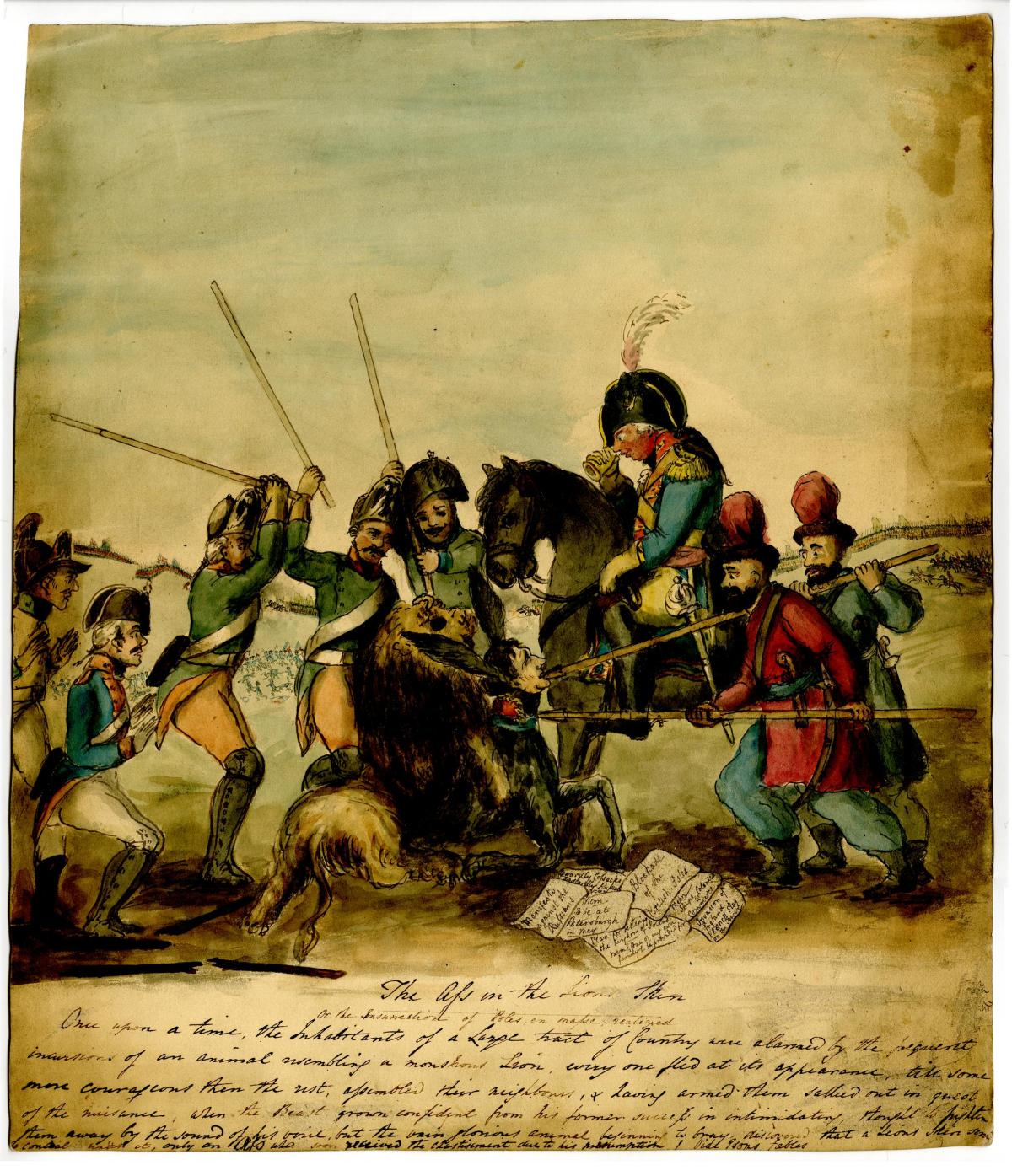Lt. Col Thomas Braddyll drew the following image in the first decade of the 19th century. The goal was to study Napoleon through visualization of a fable entitled “The Ass in the Lion’s Skin,” in which the overall lesson dictates that words and actions are louder than appearances. In this image, Napoleon is the ass covered in lion’s skin with long ears has a military collar and stock, and with officers ram him with spears. This is to demonstrate how the people were tired of the war and unbelieving of Napoleon’s promises that he had or would continue to make until the war ended.
Jane Austen herself had “immediate personal contact with the drama and suffering of the French Revolution, but did not choose to make it the subject of direct comment” (Fitzgerald para 3). This does not mean she did not comment on other wars she lived through. Austen’s own brother was part of the navy during the Napoleonic wars, and she was beyond proud of his accomplishments. During Mansfield Park and Persuasions, Austen references a few characters who lived during wartime, either through serving in the military or being a family member during times of trial. Price in Mansfield Park cares for Fanny deeply, and this bond only deepens due to his military service. McGill, Gill, et al. “Bereaved Military Families: Relationships and Identity” discusses the idea of death within the military and its impact on the family, as well as how it would affect soldiers if they were to survive and the subsequent aftermath. William, experiencing this “increased risk of…being exposed to serious and often unsafe situations that may result in…sudden or violent death,” would be fully aware of his mortality (Cawkill, 2009; Roberts et al.). As at this point he would be a captain rather a midshipman, and as such Price would first wish to protect his family with all his being.
However, there were “almost endless creations” of titled dignitaries listed in Sir Walter’s book of books, the Baronetage, their social rank inherited by name or acquired with money” (Jones). A higher rank meant making more in a year, so it would make sense that the wealthy would climb the ranks faster than the common man. This would apply to William Price who came from a semi-wealthy family. Climbing the ranks would offer more to aristocratic women. While most of “The officers of the Oxford Regiment represented many of the county's landowning and aristocratic families,” there was nothing the authorities could do to prevent these men from leaving when they were forced to leave the country (Calpin). The higher ranks were able to leave because they had the money to do so, leaving the poorer and lower ranked individuals to leave behind their families for the military. Oftentimes, they would not come back home, and this only angered the families of the poor military men.
Works Cited
Caplan, Clive. Jane Austen’s Soldier Brother: - The Military Career Of, jasna.org/persuasions/printed/number18/caplan.pdf. Accessed 8 Oct. 2024.
Fitzgerald, Jennifer. “Jane Austen’s Persuasion and the French Revolution.” Jennifer Fitzgerald, www.jasna.org/persuasions/printed/number10/fitzgerald.htm. Accessed 8 Oct. 2024.
Jones, Hazel. “‘she Had Only Navy-Lists and Newspapers for Her Authority’ " Jasna.” Jane Austen Society of North America, jasna.org/publications-2/persuasions-online/volume-39-no-1/she-had-only-navy-lists-and-newspapers-for-her-authority/. Accessed 8 Oct. 2024.
Lt-Col Braddyll, Thomas. The ass in the lions skin or the insurrection of the poles, en masse, realized. 1804.
“The Ass in the Lion’s Skin.” Library of Congress Aesop Fables, read.gov/aesop/146.html. Accessed 8 Oct. 2024.


